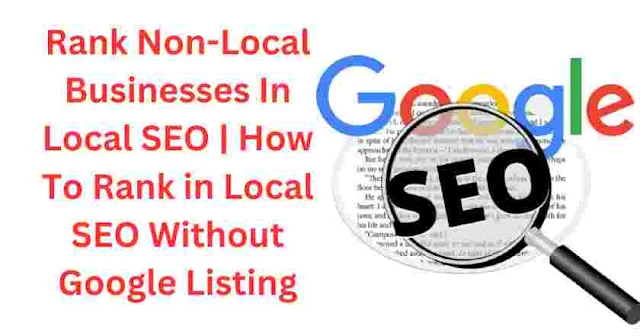Rank Non-Local Businesses In Local SEO | How To Rank in Local SEO Without Google Listing
As local search results are typically meant for businesses with physical locations or businesses that serve certain local areas, ranking non-local firms in local SEO can be difficult. Even without a Google My Business listing, there are still certain tactics you can use to increase company exposure and ranks in local searches. Here are a few advices:
Website Optimisation: Make sure your website is optimised for pertinent local keywords. In your page titles, meta descriptions, headers, and content, mention the city or area. This aids search engines in recognising your company's local significance.
Establish Location-Specific Landing Pages: If your company has many locations, establish landing pages specifically for each of them. Include information particular to your locality, such as your address, phone number, and reviews from local clients.
Create blog posts, articles, or other information that is specifically targeted to regional audiences by localising it. Talk about neighbourhood happenings, recent news, or hot industry subjects that are pertinent to the region you are targeting.
Build Local Citations: You can still establish local citations on directories and other platforms even if you don't have a Google My Business listing. Make sure the ads all have the same spelling of your company's name, address, and phone number (NAP). Yelp, Yellow Pages, Bing Places, and Apple Maps are a few examples of well-known directories.
Utilise Online Reviews: Encourage your consumers to post reviews on sites like Yelp or those devoted to your industry. Positive comments can boost your reputation and make you more visible in local search results.
Localise Your Social Media: Connect with regional audiences on social media channels. Post about neighbourhood collaborations, sponsorships, and events. Join neighbourhood organisations or communities to participate in conversations.
Optimise for Mobile: Having a mobile-friendly website is essential given the surge in popularity of mobile searches. Make sure your website runs quickly and is responsive on mobile devices.
Partner with Local Businesses: Build connections with neighbourhood companies that can enhance your offers. This may result in opportunities for cross-promotion, guest blogging, or team marketing projects, all of which could raise your profile in the neighbourhood.
Use Local Schema Markup: Add schema markup to your website to give search engines more details about your company, like your address, phone number, operating hours, and customer reviews. Your likelihood of turning up in local search results may increase as a result.
Focus on organic SEO: Without a Google listing, local SEO may be difficult, but don't ignore the principles of organic SEO. To raise your overall search rankings, optimise the functionality of your website as a whole, provide high-quality content, and generate reputable backlinks.
Remember that it is more challenging to rank in local search results without an actual location or Google listing, but you can still raise your exposure and draw local clients to your non-local business with the appropriate tactics and persistent effort.
Certainly! In order to rank in local SEO without a Google listing, consider the following extra recommendations:
Target Long-Tail Keywords: Compared to broad keywords, long-tail keywords are more specialised and less competitive. To draw local search traffic, use long-tail keywords with a local focus into your content. For instance, target the "best seafood restaurant in [city]" rather than "restaurant."
Optimise for Voice Search: People are starting to use voice search more and more, particularly for local inquiries. Provide succinct, pertinent information that addresses local search intent in your content to optimise it to respond to frequent voice search questions.
Establish Local Content Partnerships: Work together to establish profitable alliances with regional bloggers, influencers, or content producers. They can highlight your company in their writing, link to your website from theirs, or mention you in social media posts, all of which will increase your local visibility.
Participate in neighbourhood events, fund neighbourhood projects, or donate to neighbourhood organisations. By engaging in these activities, you not only boost your reputation locally but also get more exposure there and create local backlinks.
Utilise Online Directories: Look into industry- or niche-specific platforms that serve your target market in addition to well-known directories. Make sure your company is appropriately listed in pertinent directories to improve your chances of being found in local searches.
Employ Local Influencer Marketing: Work with neighbourhood influencers who have a sizable local fan base. They can produce material that highlights your company, share their personal stories, and advertise your offerings to their community, increasing local awareness and engagement.
Featured snippets are brief summaries that are full with information and appear at the top of search engine result pages. Increase your chances of being included and attracting local search traffic by producing content that directly responds to frequent local questions.
Actively look for opportunities to create local backlinks by participating in local link building. Speak with local bloggers, reporters, or organisations and offer them useful information or materials about your sector. Local backlinks might arise from this, and they are beneficial for local SEO.
Monitor Local Mentions and React: Pay attention to any online mentions of your company, even if they don't contain a link to your website. In particular on social media, respond to any mentions quickly and warmly to foster local engagement and brand repute.
Encourage the creation and sharing of user-generated content about your company by your clients on social media and other websites. When users identify your area or use regional hashtags, user-generated material offers social proof and can raise local visibility.
Keep in mind that local SEO is a continuous process, so it could take some time before you start to see real results. Implement these techniques consistently, monitor your development, and adjust your strategy in response to performance and criticism.


No comments:
Post a Comment